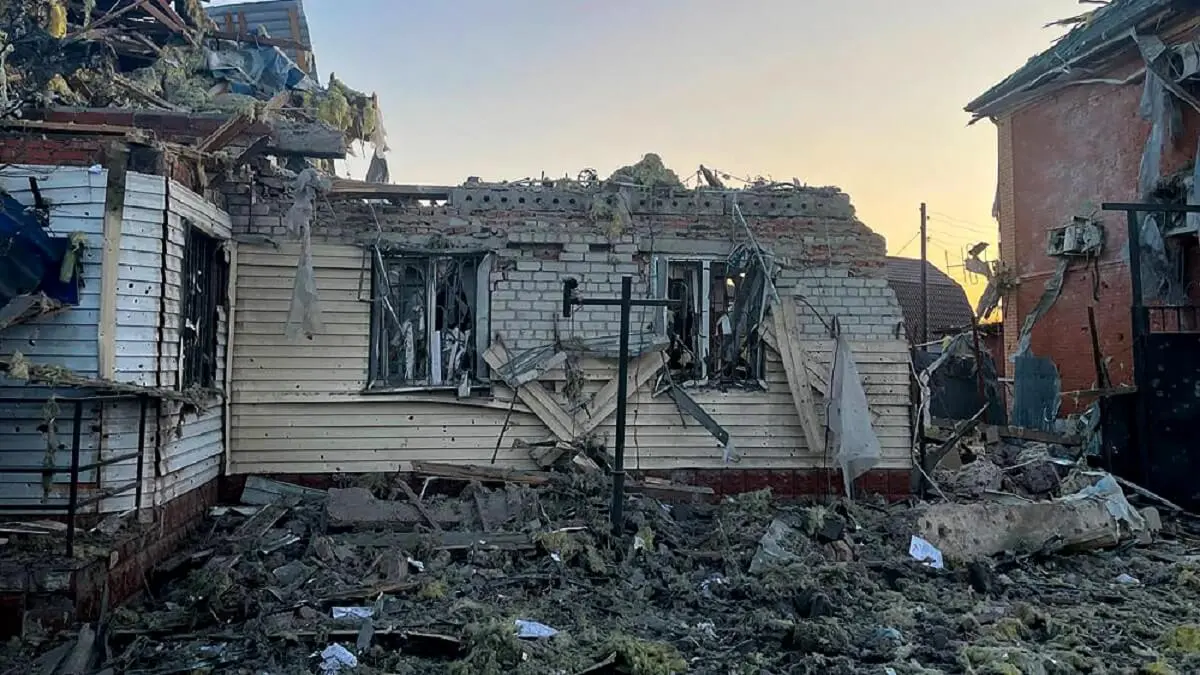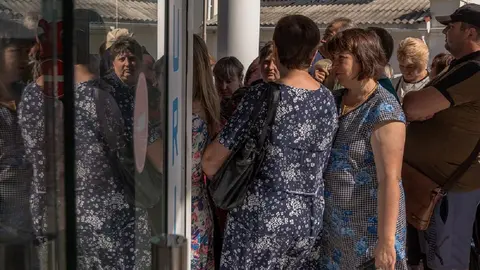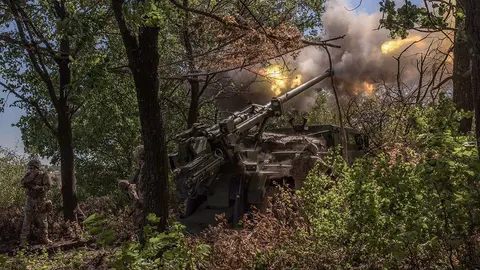Ukraine changes the invasion narrative with its offensive

Russian dictator Vladimir Putin has said that the only negotiation for peace must include the Kiev government agreeing to lose part of the invaded Ukrainian territory; that is, the 25% that includes the provinces of Kherson, Zaporiyia, Donetsk and Lugansk. And the recognition of Crimea and Sevastopol as part of the Russian Federation.
The Kremlin wants to create a land and sea corridor that would link Russia with Crimea and would mean controlling the Sea of Azov and part of the Black Sea with important refineries, shipyards and a powerful nuclear power plant such as Zaporiyia.
In exchange for the withdrawal of its troops, Putin is also demanding that Kiev sign a document of permanent neutrality that includes non-membership of the North Atlantic Treaty Organisation; and he is also asking the West to lift all the vetoes and sanctions imposed on the Russian economy.
At the Ukrainian Peace Summit in Burgenstock, Switzerland on 15-16 June, President Volodymir Zelensky insisted that he was not prepared to cede any territory to Putin. "We will stand united and strong".
This first major step towards peace called for by Kiev did not achieve unanimity among the countries attending the forum: of the 92 countries that participated, some, such as Brazil, South Africa, Mexico and Saudi Arabia, did not support a final declaration. Mexico, for example, reiterated the need for Russia's presence at a new meeting.
Indeed, in mid-July, the Ukrainian president stated that a Russian delegation would be necessary to negotiate a ceasefire at the second phase of the peace summit he plans to hold in November (again in Switzerland).
There is internal pressure among the Ukrainian population to end the conflict. According to a ZN poll, 44% of Ukrainians believe that peace negotiations should start now, while 35% are opposed and 21% have no clear opinion.
The approaching presidential elections in the United States on 5 November have put pressure on Zelenski, who knows that former president Donald Trump has a good chance of returning to power in the White House in January 2025.
At his campaign rallies, when Trump talks about the international situation, especially Ukraine, he claims to have a plan to end the war. Indeed, in an interview with Reuters he said that Ukraine should be prepared to "cede" territory.
Regarding these statements, Zelenski reiterated that both the Democratic and Republican parties understand the importance of supporting Ukraine.
"With regard to the vision of Donald Trump, one of the candidates for the presidency, it is something I understand in general. I want to say that if he gets the victory we will be ready to work together... I am not afraid of that," the Ukrainian dignitary told the Ukrainian press.
The one-fifth of Ukrainian territory that Russia wants to keep is an impediment to peace, and several NATO member states fear that giving Putin the upper hand would be another historic mistake. French President Emmanuel Macron himself reiterates that it was a grave mistake to grant Hitler 30,000 square kilometres of the Sudetenland region that belonged to Czechoslovakia.
In September 1938, at the Munich Conference, the fate of Czechoslovakia, which lost this territory, was decided: the rulers of France, the United Kingdom and Italy believed that Hitler would not invade any more countries if he was given this claimed territory because there was a large German population; however, they were mistaken; by August 1939, the invasion of Poland was already prepared.
A group of countries including France, Ukraine, Moldova, Slovenia, Slovakia, Estonia, the UK, Poland and Germany believe that Putin will not settle for one-fifth of Ukrainian territory. Some intelligence analyses warn of the enormous risk of a confrontation between Eastern Europe and Russia within five years.
"He talks about regions of our country and says he will not stop. It's the same as Hitler did, when he demanded a part of Czechoslovakia, it's just a matter of knowing history. He can't be trusted, he has shown that he is unpredictable," Zelenski told CNN affiliate Tg24.
However, a couple of weeks later, the Ukrainian leader even mentioned the possibility of a plebiscite in an interview with French media including Le Monde, AFP and L'Equipe: "Decisions on the territorial integrity of Ukraine cannot be taken by the president, but by the Ukrainian people". Zelenski did not rule out, when the time came, proposing a referendum to the population and asking whether they would agree to make territorial concessions to end the war.
A poll conducted in May by the Kiev International Institute of Sociology (KIIS) found that a third (32%) of Ukrainians would agree to cede territory for peace and independence compared to 26% in February this year and 9% in February 2023.
More than half (55%) still oppose ceding territory to Russia if it would end the war, but this is down from 74% in December 2023. Meanwhile, Ukrainian media outlet ZN reported in July that 44 per cent of people in the country agreed that the time had come to start negotiations with Russia.
A shift in strategy
Ukraine's moves these days to completely change its defensive strategy towards more offensive aggression are seen in the European Union (EU) not only as a surprise factor, but as a clever strategy that would allow Kiev to have something to negotiate with the Kremlin without having to give in to all the demands that both Trump (should he win the election) and Putin want to impose as a condition for a ceasefire.
On 6 August, the Ukrainian army began a military incursion into the Russian Federation, entering its territory with troops and deploying in the Kursk region.
Oleksander Sirski, Chief of Staff of the Ukrainian Armed Forces, claims that his troops control some 1,000 square kilometres of Russian territory.
For their part, the Russian authorities have acknowledged that Ukraine has already seized 28 localities in the Kursk province. The governor of the region, Alexei Smirnov, said during a meeting with Putin that Ukrainian forces had managed to deepen their operation and extend up to twelve kilometres from the border, while the front line is forty kilometres wide.
Smirnov, who described the military situation as difficult, explained that the attacks of the last few days have left a total of 121 wounded and some 120,000 evacuated.
Sirski, for his part, explained that the offensive operations on the territory of the Kursk region are still underway. "The fighting continues practically along the entire front and the situation is under control," said the coordinator of the invasion of Russia.
Zelensky pointed out that these territories now under Ukrainian control were the areas from which the Russian army launched attacks on the Sumi region, some 2,100 strikes since 1 June.
"It is right to destroy Russian terrorists wherever they are. This is the disaster of war and it always happens to those who despise people and rules. Russia has brought war to others and now it is coming home. Ukraine has always wanted only peace and we will definitely guarantee peace," the Ukrainian leader stressed.
In a lengthy BBC editorial, this strategy is referred to as a significant reversal of the Russian-initiated invasion and should not go unnoticed. First of all, the Russian Federation, the world's second nuclear power, is being invaded by a smaller army armed with artillery from several Western countries, mainly the US.
The last time Russia was invaded was the USSR and Hitler ordered his army to start the war incursion on 22 June 1941 under Operation Barbarossa.
What is Ukraine looking for with this risky move and how does it change the course of the war? According to the BBC there are several considerable aspects: 1) a change of narrative where the weak show strength and courage; 2) a new negotiating position; 3) possible redeployment of soldiers forcing the Russians to retreat; and 4) the display of a weak Putin with a disorganised army.
The Independent warns that Ukraine has a problem with the number of soldiers it can put on the battlefield despite its recruitment efforts.
The Kursk operation is unlikely to create a long-term strategic opportunity for Kiev, as troops will not be able to hold the ground gained for long; there are many more symbolic reasons to cross the border. The two main reasons are to boost morale and to show both Moscow and Western allies Ukraine's determination to defend its country.
"The Ukrainian army will force the Russian army to resupply its lines, probably by withdrawing troops from an offensive in the Kharkiv region, just across the border, which is where it had been making gains against Kiev soldiers", according to The Independent.
EU fears Russia's response
Vedant Patel, a spokesman for the US State Department, said there is concern in the White House about the possible use of hundreds of Iranian ballistic missiles by the Russian military.
"We have been warning about the deepening partnership of security arrangements between Iran and Russia. This partnership threatens European security because it's not just drones now it will be ballistic missiles," according to Patel.
Antony Blinken's spokesman said the US and its allies are prepared to respond "swiftly and severely" if Iran goes ahead with the transfer of ballistic missiles. He did not elaborate on what that response would consist of.
More than ten days after the incursion of Ukrainian troops into Russia's Kursk region, the Russian government has ordered the opening of 400 temporary shelters across the country to house 30,000 evacuees, although it is estimated that more than 121,000 people have fled their homes.
What does Zelenski want? He knows he has neither the army nor the weapons to sustain his boldness for long. In fact, through the Ukrainian Foreign Ministry, it is stated that the Kiev government does not intend to annex any part of Russia, that its only aim is to achieve a ceasefire and for the invading troops to leave Ukraine. Putin announced from the Kremlin that Ukraine will pay dearly for this action, for which he is already preparing a forceful response.



